Search Results
Showing results 21 to 40 of 45

Marshmallow Models
Source Institutions
No glue is needed for learners of any age to become marshmallow architects or engineers.

Under Pressure
Source Institutions
In this simple activity, learners discover how a mere piece of paper can be used to hold up the weight of a heavy book.

Hot Stuff!: Investigation #4
Learners test two jars containing soil, one covered and one open, for changes in temperature. After placing the jars in the Sun, learners discover that the covered jar cools down more slowly.

Dripping Wet or Dry as a Bone?
Learners investigate the concept of humidity by using a dry and wet sponge as a model. They determine a model for 100% humidity, a sponge saturated with water.

Hot Stuff!: Investigation #1
Learners test two jars, one containing plain air and one containing carbon dioxide gas, to see their reactions to temperature changes.

Fun with Bernoulli
Learners conduct four simple experiments to demonstrate the effects of air pressure.

A Merry-Go-Round for Dirty Air
Learners build a model of a pollution control device--a cyclone. A cyclone works by whirling the polluted air in a circle and accumulating particles on the edges of the container.
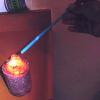
Hot Stuff!: Carbon Dioxide Extinguishes a Flame
In this demonstration, learners observe vinegar and baking soda creating carbon dioxide (CO2) in a bottle. The gas is poured out of a bottle onto a candle flame, putting out the candle.
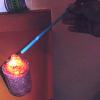
Hot Stuff!: Creating and Testing for Carbon Dioxide
In this demonstration, learners observe vinegar and baking soda reacting to form carbon dioxide (CO2) gas.

Hot Stuff!: Investigation #2
Learners test two jars containing hot water, one covered with plastic and one open, for changes in temperature.

Hot Stuff!: Investigation #3
Learners test two jars of ice water, one covered and one open, for changes in temperature. After placing the jars in the sun, learners discover that the covered jar cools down more slowly.
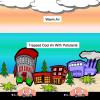
Turning the Air Upside Down: Convection Current Model
Learners see convection currents in action in this highly visual demonstration. Sealed bags of colored hot or cold water are immersed in tanks of water.
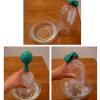
Turning the Air Upside Down: Warm Air is Less Dense than Cool Air
Learners cover a bottle with a balloon. When they immerse the bottle in warm water, the balloon inflates. When they immerse the bottle in a bowl of ice, the balloon deflates.
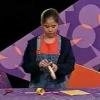
Hoop Glider
Source Institutions
In this activity, learners engineer a flying glider using paper hoops and a drinking straw.
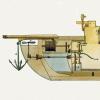
Design a Submarine
Source Institutions
Learners act as engineers and design mini submarines that move in the water like real submarines.

Super Golf Tower
Source Institutions
In this engineering activity, challenge learners to build a tower out of 10 sheets of newspaper and 3 feet of masking tape, which can hold a golf ball balancing at the top.

Paper Bridge
Source Institutions
In this engineering activity, challenge learners to construct a paper bridge that can support 100 pennies.
Stranded
Source Institutions
What's a more compelling problem to solve than being stranded on a deserted island?
Dowels and Rubber Bands I
Source Institutions
If you have 3-foot dowels and rubber bands, you can can started on this fun and open design challenge. You can make structures big and small: make it so you can fit your parent into it!

Action Figure
Source Institutions
In this project, students explore how levers work, by making a puppet with moving limbs.
